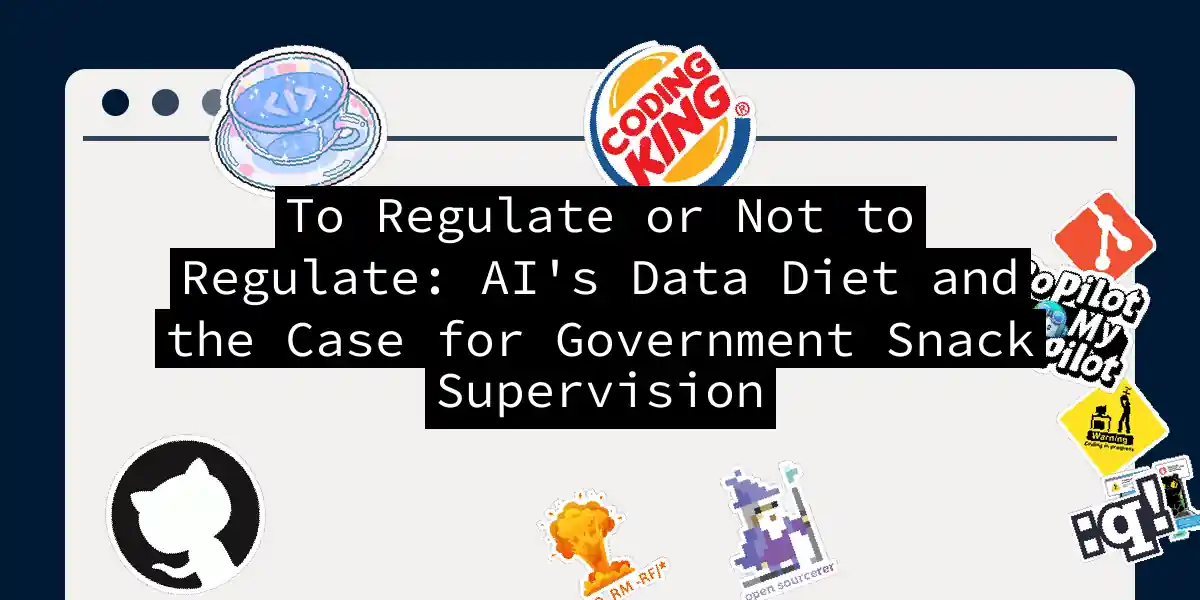Picture this: you’re training an AI model like it’s a particularly chatty parrot. You feed it 10,000 romance novels, and suddenly it starts spitting sonnets. Give it 4chan archives, and… well, let’s just say you’ll need ethical mouthwash. This is why I argue governments need to be the nutritionists of AI’s data diet - because left unsupervised, our models might develop ideological scurvy.
The Great Data Buffet: Why Regulation Isn’t Optional
AI models munch data like competitive eaters at a hotdog contest. But here’s the rub:
- 50% of training datasets contain personal data shadows we didn’t consent to share
- Medical AI models frequently choke on incomplete public health data
- 78% of developers admit they don’t fully know their data’s provenance
This Mermaid diagram shows why we need closed-loop governance. Without the regulatory seasoning, we’re just throwing random ingredients into the AI stew.
Code Meets Policy: Practical Implementation
Let’s get our hands dirty with some Python pseudo-code. Here’s how governments could enforce dataset transparency:
# Basic dataset audit framework
import pandas as pd
from ethical_ai_toolkit import DataProvenanceChecker
class DatasetValidator:
def __init__(self, dataset_path):
self.df = pd.read_csv(dataset_path)
self.auditor = DataProvenanceChecker()
def run_checks(self):
print(f"Analyzing {len(self.df):,} rows...")
print(f"Personal data detected: {self._find_pii()}")
print(f"Copyright flags: {self._check_copyright()}")
print(f"Source transparency score: {self.auditor.score(self.df)}")
def _find_pii(self):
return self.df.apply(lambda x: x.str.contains('@|SSN')).any().any()
def _check_copyright(self):
return self.df.attrs.get('licensing', 'Unspecified')
This simple script (which you can extend with real PII detection libraries) demonstrates how regulators could automate basic compliance checks. Add some government API endpoints for validation, and boom - you’ve got the start of an audit framework.
Global Regulatory Taste Test
Current approaches worldwide look like a poorly planned potluck:
- EU: “Write the recipe in ancient Latin before cooking” (AI Act requirements)
- USA: “Bring whatever, but label allergens… maybe?” (FTC guidelines)
- Japan: “Please whisper where you shopped” (draft traceability rules)
- UK: “We trust you’ll use good ingredients wink” (CMA principles) My hot take? We need standardized data nutrition labels - think cereal boxes for datasets. Here’s what that might look like in YAML:
dataset_label:
name: Medical_Images_2025
ingredients:
- 65% X-rays
- 30% MRI scans
- 5% TikTok dance videos (oops)
provenance:
- Hospital_A: 40%
- Hospital_B: 60%
allergens:
- PII: 0.2%
- Copyrighted: 15%
ethical_rating: B+
The Developer’s Dilemma: More Red Tape or Better Tools?
Yes, regulation sounds about as fun as debugging CUDA errors. But consider this - public AI-ready datasets like the UK Data Service could become the Whole Foods of machine learning. Governments could:
- Maintain certified data marketplaces
- Offer tax breaks for using audited datasets
- Fund “data cleaning” public works programs Imagine a world where instead of scraping dubious forums, you:
govdata-cli download --category=healthcare --compliance=EU
This fictional CLI tool represents how regulated data access could become as easy as npm install, but with less dependency hell.
At the end of the day, unregulated AI training is like letting a toddler plan their meals. Sure, they might discover that ketchup and ice cream technically mix, but do we really want a generation of models raised on digital junk food? The recipe for success needs three ingredients: government oversight, developer responsibility, and public engagement. Now if you’ll excuse me, I need to go audit my cat picture dataset for hidden political bias… again.
